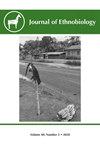Patagonian Ethnopedology and Its Role in Food Security: A Case Study of Rural Communities in Arid Environments of Argentina
IF 1.3
3区 社会学
Q1 ANTHROPOLOGY
引用次数: 0
Abstract
Local knowledge of horticultural soils was analysed from an ethnobiological perspective in a rural population of arid Patagonian, in order to gain a deeper understanding of how the farmers classify, use and value the soil. In this large but sparsely populated territory, a group of 27 participants was selected. The farmers use an ethnoclassification system that distinguishes nine different soil types according to their horticultural aptitude. The classification criteria are based on the morphological attributes of the soil and certain ethnoindicators (i.e., texture, structure, colour and plant species present). All these aspects, evaluated within the framework of local symbolic and cultural precepts, proved to be key to the management of soils with pronounced edaphic and climatic limitations in terms of farming. Recognition of local knowledge and its contribution to dealing with current socioenvironmental challenges and crises may favour the design of more sustainable farming production in communities that are socio-environmentally vulnerable, considering the populations, soil, and culture as components of a complex integrated system, and not as isolated elements.巴塔哥尼亚民族学及其在粮食安全中的作用——以阿根廷干旱环境中的农村社区为例
从民族生物学的角度分析了巴塔哥尼亚干旱农村人口的当地园艺土壤知识,以便更深入地了解农民如何对土壤进行分类、使用和评估。在这个面积大但人口稀少的地区,选出了27名参与者。农民使用一种民族分类系统,根据他们的园艺才能区分九种不同的土壤类型。分类标准基于土壤的形态属性和某些民族指标(即质地、结构、颜色和存在的植物种类)。所有这些方面,在当地象征和文化戒律的框架内进行评估,证明是管理土壤的关键,因为土壤在农业方面具有明显的地理和气候限制。认识到当地知识及其对应对当前社会环境挑战和危机的贡献,可能有利于在社会环境脆弱的社区设计更可持续的农业生产,将人口、土壤和文化视为一个复杂的综合系统的组成部分,而不是孤立的元素。
本文章由计算机程序翻译,如有差异,请以英文原文为准。
求助全文
约1分钟内获得全文
求助全文
来源期刊

Journal of Ethnobiology
Social Sciences-Anthropology
CiteScore
4.80
自引率
3.40%
发文量
21
审稿时长
>12 weeks
期刊介绍:
JoE’s readership is as wide and diverse as ethnobiology itself, with readers spanning from both the natural and social sciences. Not surprisingly, a glance at the papers published in the Journal reveals the depth and breadth of topics, extending from studies in archaeology and the origins of agriculture, to folk classification systems, to food composition, plants, birds, mammals, fungi and everything in between.
Research areas published in JoE include but are not limited to neo- and paleo-ethnobiology, zooarchaeology, ethnobotany, ethnozoology, ethnopharmacology, ethnoecology, linguistic ethnobiology, human paleoecology, and many other related fields of study within anthropology and biology, such as taxonomy, conservation biology, ethnography, political ecology, and cognitive and cultural anthropology.
JoE does not limit itself to a single perspective, approach or discipline, but seeks to represent the full spectrum and wide diversity of the field of ethnobiology, including cognitive, symbolic, linguistic, ecological, and economic aspects of human interactions with our living world. Articles that significantly advance ethnobiological theory and/or methodology are particularly welcome, as well as studies bridging across disciplines and knowledge systems. JoE does not publish uncontextualized data such as species lists; appropriate submissions must elaborate on the ethnobiological context of findings.
 求助内容:
求助内容: 应助结果提醒方式:
应助结果提醒方式:


